
LOCOMOTIVE JOURNAL
JANUARY 1911
Extracted and adapted from
A.S.L.E.F. Organising Secretary W. Warwick's report
page 17
Events that took place from mid November 1910
I also visited our Battersea Branch and saw the secretary on an important matter affecting the London, Brighton and South Coast Railway men, and the following day attended a delegate" meeting in the afternoon, at New Cross, and in the evening a meeting belonging to our Westminster Branch. The delegate meeting at New Cross should have consisted of the old delegation mentioned in my last report, but the A.S.R.S. members of that body were conspicuous by their absence on this occasion, although they had been summoned by the corresponding secretary. The tactics throughout this business, by those who have endeavoured to make it a society question rather than the uplifting of the men, have practically nullified the efforts put forth to improve the position, and ought to be a lesson to all locomotive-men on the folly of being in a society which has to resort to such methods to keep the few locomotive-men they have.
I was also able to attend this and on arriving home again found a wire from our Brighton
Secretary, informing me of a fatal accident had occurred at locomotive shed there, which
required my attention. Needles to say I lost no time getting on the road again the last
mentioned places.
I returned home on the Monday 28th, November 1910 and found instructions awaiting
me from the General Office to attend a Board of Trade, inquiry, at Battersea Park
Station, on the following morning (Tuesday 29th). I attended to this and had scarcely
reached home in the evening were I received a post card from our Battersea secretary
asking me to attend a further Board of Trade inquiry at the locomotive shed on the
following day (Wednesday 30th). I was also able to attend this and on arriving home
again found a wire from our Brighton secretary, informing me a fatal accident had
occurred at the locomotive shed there, which required my attention. Needless to say I
lost no time in getting on the road again for the last mentioned place.
The inquiry at Battersea Park Station was with regard to a fatal accident to one of the
men employed on the fixing of pillars, &c, for the electrification of the railway. The
evidence went to prove that no blame was attached to anyone but the poor fellow
himself, who, after being warned of the approach of the train, walked away from the
others with his back to the train, the engine of which struck him in the side, causing
injuries which proved fatal.
The inquiry Wednesday 30th, (November) 1910 in the locomotive shed was to ascertain the cause of the fatal accident to a man who was working with the joiners employed repairing the shed; it seemed he had gone for a piece of timber and on returning, attempted to pass between wagons which stood a few feet apart, and while doing so they were closed up, pinning him between the buffers. Here, again, this act of indiscretion cost the poor fellow his life, but in neither case were our men to blame. The sad case at Brighton differed somewhat, inasmuch as an aged driver was the victim. It appears C. Ford, driver, on arriving at the shed, went at once to see the duty sheet to ascertain his working for the next day, this being necessary in order that he may turn his engine, or otherwise, before booking off; on returning he by some means was knocked down and run over by an engine being shunted for proper stabling. It was dark at the time and no one actually saw the occurrence, and the only intimation the driver of the engine had was the hearing of a groan; he stopped at once, only to find poor Ford had been rolled up under the engine and his legs run over, injuries to which he succumbed on the way to the hospital.
I attended the inquest next day (Thursday), December 1st, when the verdict was
"accidental death," no one in any way being to blame. One sad feature about the case
was he had done some 40 years in the service and had only a few months longer to work
before being entitled to superannuation.
LOCOMOTIVE JOURNAL
FEBRUARY 1911
Extracted and adapted from
A.S.L.E.F. Organising Secretary W. Warwick's report
page 75
On December 17th 1910, I arranged for, and attended, an open meeting at Brighton. We had a nice little company present, and perhaps the secretary will tell us, in the whether it has borne fruit or not. Whatever the result may be, I want to tell the London, Brighton and South Coast Railway locomotive-men, there is plenty of room for improvement. Our meeting was affected in numbers by the fact that members of a deputation were giving a report elsewhere of an interview with the “powers that be re electrification." This very fact spells weakness, and until the London, Brighton and South Coast Railway locomotive-men can rise to the occasion by joining their own Society, and move as one body for improved conditions of service, the much-desired and deserved improvement is not likely to come their way; a hint is as good as a nod, so I hope the Brighton men understand, and will act accordingly.
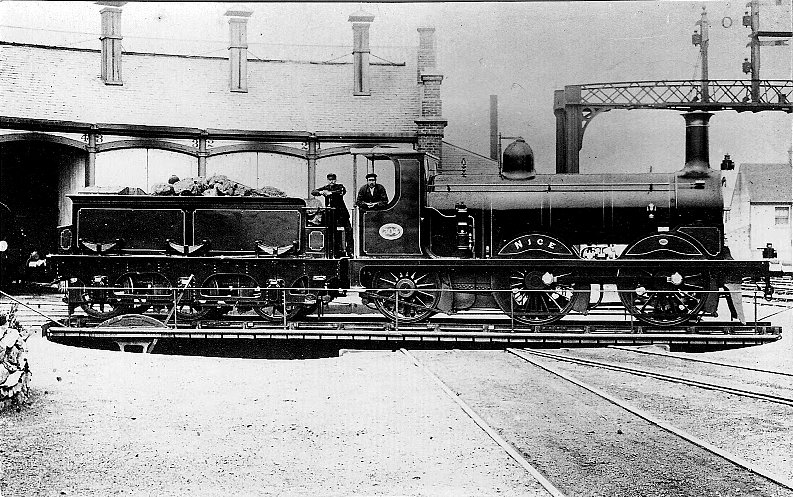
PHOTOGRAPHER UNKNOWN
Eastbourne Semi Roundhouse Loco Shed 1876 - 1911
LOCOMOTIVE JOURNAL
PAGE 83
FEBRUARY 1911
EASTBOURNE BRANCH
EASTBOURNE.—Socialist Hall, 95A, Cavendish Place.
An open meeting was held here on Sunday, January 8th, when Mr. W. Warwick addressed a meeting, which was well attended. His address was greatly appreciated and a few questions were put re conciliation boards and Eight Hours Bill. The following resolution was put to the meeting:-
"That in the opinion of this meeting, the time has arrived for all enginemen, firemen and cleaners to become members of the Associated Society, and remain steadfast and true, and by noble brotherhood of societies, build up a gigantic federation, which would benefit all,"
and was carried unanimously. A vote of thanks to Mr. Warwick brought a very successful meeting to a close. Brother C. Broomfield, our branch chairman, presided, and we made one new member. That a few more may be forthcoming is the hope of
BRANCH SECRETARY.
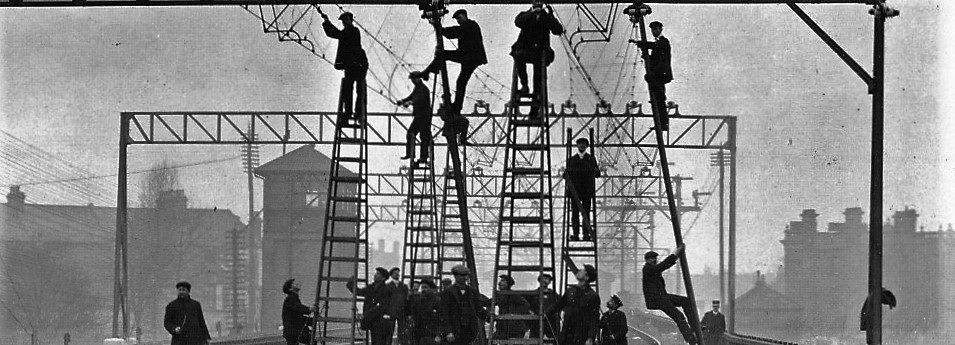
PHOTOGRAPHER UNKNOWN
The construction of the elevated electrification at Balham
LOCOMOTIVE JOURNAL
MARCH 1911
Page 112
MONTHLY COMMENTS
ON LOCOMOTIVE AND GENERAL RAILWAY MATTERS.
By F. W. BREWER.
A small batch of new "Atlantics " is also to be put into service on the London, Brighton and South Coast Railway. Mr. D. E.Marsh is having these engines fitted with Schmidt super-heaters, and with 21 in. by 26 in. cylinders. There was some talk that a four-cylinder simple "Atlantic " was to.be built. The company propose to run each of the Brighton express trains on the hour. The electrification of the main-line between London, Brighton and Eastbourne, is, we understand, also under consideration.
The statement, however, that electrically propelled trains would be running on the main-line in about three years' time would appear to be premature. At the recent meeting of shareholders, the Earl of Bessborough stated that the board had naturally thought of electrification, and were seeking advice upon the possibility of carrying it out, but the conditions of working a mainline traffic would differ very considerably from those obtaining in a suburban service, so that much consideration would be necessary before any definite decision could be arrived at.
We might add here that the rumoured electrification of the London, Tilbury and Southend Railway seems to be improbable, in view of the proposed purchase of the line by the Midland Company.
EASTBOURNE LOCO SHED
(L.B.S.C.R. Shed Code E, Southern Railway Code 75G)
Eastbourne Loco seven road shed was opened in 1911 replacing the semi-roundhouse. This
locomotive steam shed remained until the steam was officially withdrawn on 13th June 1965.
The steam depot remain opened but now called a Mixed Traction depot. Mixed Traction
finally closed on the 30th November 1968
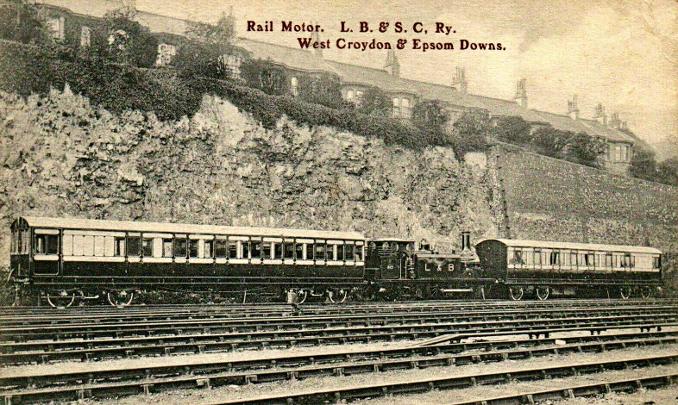
STORIES FROM THE SHOVEL
extracted from RTCS book on locomotives of the LBSCR
On the evening of 11th March, 1911, when Driver McKay (New Cross) was in charge of a “I3 Class", No. 80, was in charge of the 10.25 p.m. London Bridge - Brighton express ran out of water just South of Burgess Hill. After coming to a stop, Driver McKay was so furious with his Fireman for failing to fill the tanks before leaving New Cross that he threatened him with a coal hammer and was instrumental in the latter stepping so rapidly off the footplate that he slipped and was severely concussed. Whatever the rights or the wrongs of the matter, both men were later fined and relegated to goods duties.
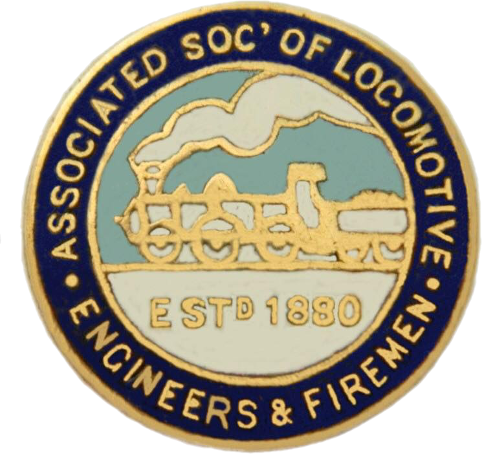
LOCOMOTIVE JOURNAL
APRIL 1911
PAGE 181
BATTERSEA AND NINE ELMS BRANCHES
The members of the above branches had their annual dinner at the Masonic Hall, Stanley's Restaurant, on Monday, March 6th, when a most enjoyable evening was spent. Our organizing secretary, Mr. Warwick, took the chair in the absence of Mr. Fox. The health of the chairman was submitted by Brother P. Turner and was received with musical honours. In reply the chairman said he hoped this dinner would be the means of increasing the members of our Society. Brother T. Higgins then proposed the toast : “Prosperity to the Associated Society of Locomotive Engineers and Firemen." Brother Stevenson, from Slade’s Green, in his response, said he heard the London and South Western railwaymen had made a stir in the right direction and he hoped they would continue to be active. (Hear, hear.) In their grievances the members would always have the assistance of Mr. Fox and the whole of the Executive Council. Brother A. Harrison proposed the toast of the London solicitor: " Mr. A. Tippetts." He said he had that evening received a wire from Mr. Tippetts, and he was sure all that night missed the fam liar face which had been in the chair at previous dinners, and assured them that although Mr. Tippetts was not present in person his mind was undoubtedly with them, and at the request of all present he had sent Mr. Tippetts a telegram wishing him health, wealth, and prosperity. The toast of “The Press” was proposed by Mr. H. Hancock, and amongst those who contributed to the harmony were Brothers F. Symonds, F. Atkinson, A. Philpot, G. Mannell, A.J. Reade, C. Deller, A.F. Densley, W. Suckling, and our old veteran the “Clapham Giant,” otherwise known as “Teddie.” Brother A. Finch gave some tasteful solos on a one stringed violin of his own construction. The programme was brought to a conclusion with the singing of “Auld Lang Syne.”
A.C.H.
LOCOMOTIVE JOURNAL
APRIL 1911
Extracted and adapted from
A.S.L.E.F. Organising Secretary W. Warwick's report
Page 166
On Monday 6th Feb, I got a letter from our Purley Branch secretary, asking me to represent him at an inquest on the following day, as they had unfortunately knocked down and killed a man engaged on the work of electrification near to Clapham Junction. I went to the Battersea Mortuary and got all particulars and attended accordingly the next day (Tues 7th).
In this case the poor fellow, whilst walking along the line in connection with his duties, appeared to have got 'mystified, by fog and steam hanging about and stood still in the four-foot until he was run down, our men being unable to see him until they were within a few yards of the place where he stood. The usual verdict of " accidental death " was passed, with no blame to the driver. The coroner, during his remarks, gave it as his opinion that " out-of-works," over forty, ought not to be employed on a railway, as they could not at that age adapt themselves to the work.
On the following Friday (10th ) I attended a meeting of London, Brighton and South Coast Railway delegates, at the Thomas a Becket, Old Kent Road, for the purpose of considering the question of the forth coming election to conciliation boards.
Brother Stevenson attended, representing the Executive Council, and the position was thoroughly gone into and the necessary arrangements made.
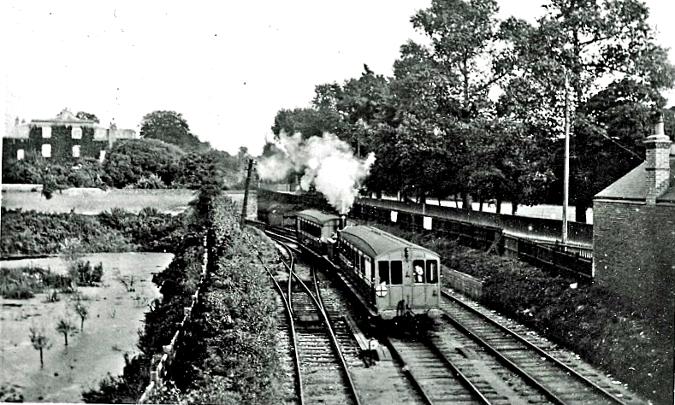
LOCOMOTIVE JOURNAL
MAY 1911
Extracted and adapted from
A.S.L.E.F. Organising Secretary W. Warwick's report
Page 217
On the Monday 6th March I had th honour of presiding at the annual dinner of Nine Elms and Battersea Branches. Mr. Tippets, our London solicitor, and Mr. Fox, both being unable to accept the position, Mr. Tippets owing to illness and Mr. Fox owing to pressure of business. The affair - was all that could be desired.
The following day (Tuesday 7th March) I attended a Board of Trade inquiry at Clapham Junction as to the cause of a fatal accident to a contractor's labourer. Mr. Armytage was the inspecting officer, and when we visited the spot found something to think about when we saw the condition of the bridges where the ppor fellow met his death. At the time of the accident it was some what foggy and steam was coming up through the bridge from a line below. He was among a gang of over 20 which was crossing and another train was passing at the time on the next road, so it was a question of getting off the bridge at either end or getting off on the only side available, and this was covered with point-rods, wires, &c, and not planked over between the girders, so that a man stood a chance of falling through on to the line below ; under the circumstances it is no wonder the poor fellow hesitated until it was too late. To say the least, there are a good many death-traps about our railways yet.
NEWHAVEN ENGINEMEN
IGNITING THE FLAME OF A.S.L.E.F.
On Wednesday 3rd May, 1911, found W. Warwick, A.S.L.E.F. Organising Secretary at Newhaven, which is about the only locomotive shed on the Brighton line where we have not got a branch of our Society. W. Warwick got to work and the necessary preparations by way of hall and bills for open meeting on the Sunday 7th May. but on the Friday 12th May he was called away to attend a Board of Trade inquiry at New Cross.
W. Warwick returned to Newhaven on Sunday, and at the meeting a few of our members from Brighton and Eastbourne attended, together with Brother Harrison, of Battersea, who preside, but the Newhaven men made a poor show in turning up. However, it was very interesting and this who did attend went away wiser with regard to the position and doing of our Society, and thus, I hope, the first step was taken towards stabbing a branch of our Society at Newhaven.
THE SECOND SECTION OF ELECTRIFICATION
TO CRYSTAL PALACE
The electrified line between Victoria and Crystal Palace was brought into use 12th May 1911, and coincided with the visit of King George V to the Palace to open the Festival of Empire to celebrate his Coronation year.
The full electric service was not inaugurate until the 1st June 1911. At the same time the extension through to Norwood Junction and on towards Selhurst was electrified to give access to the new Selhurst Carriage Sheds and depot. Only a few electric trains working into or out of traffic served Norwood Junction. From Balham to Victoria, the main line was also electrified between Balham and and Clapham Junction in 1911 and the remainder on the 1st June, 1912, this permitting two electric trains to arrive and depart at Victoria simultaneously.
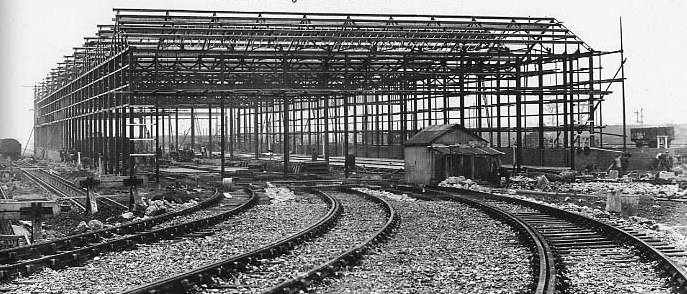
PHOTOGRAPHER UNKNOWN
Extract from the Railway Magazine June 1911
The construction of the A.C. Carriage Sheds at Norwood Junction
NEW MOTORMAN’S DEPOTS
Selhurst and Crystal Palace Motorman’s Depot 12th May 1911
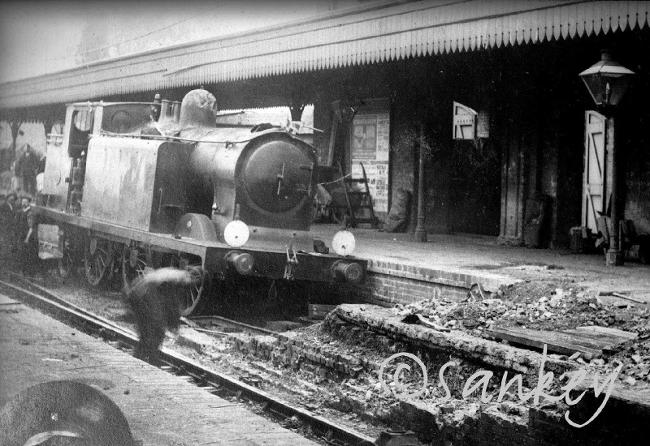
LOCOMOTIVE JOURNAL
MAY 1911
PAGE 230
PORTSMOUTH BRANCH
It is a long time since you heard from this branch, and no doubt you will think we have been napping, but we are evidently waking up as we have recently made five new members and have great hopes, of more to follow. At our quarterly meeting, held on April 2nd, we had about half of our members present. After the usual business, the report of the Board of Trade inspector on the recent Aisgill Moor disaster was read, and the finding was strongly condemned as most unjust to our fraternity. A tribute was paid to Mr. Fox and his co-workers for their untiring energy on behalf of footplate workers. The chairman, Brother L. Cook, called upon Brother Higgins, chairman of Nine Elms Branch, who had honoured us with a visit, to say a few words. Brother Higgins stated he had been at work all night and wasn’t prepared to come and address us, as it was only by chance he was there at all. Having seen a printed notice of our meeting he thought he would drop in. Nevertheless he gave us a brief summary of our recent movement and also touched upon Rule 55, medical and eye- sight test and Eight Hours Bill and its Amendments as drawn up by the Executive Council, all of which proved very interesting .A vote of thanks was proposed by Brother Hutton and seconded by Brother R. Stone to Brother Higgins for his very interesting address. Brother Higgins suitably responded, saying he would be only too pleased to come again if ever he had the same opportunity. We also had present Brother Wright, of London, Brighton and South Coast Railway, one of our members and also one of the candidates, and we hope a successful one, for the conciliation board of that company. Trusting you will hear again from this branch in the near future reporting good progress is the wish of
ONE OF THE MEMBERS.
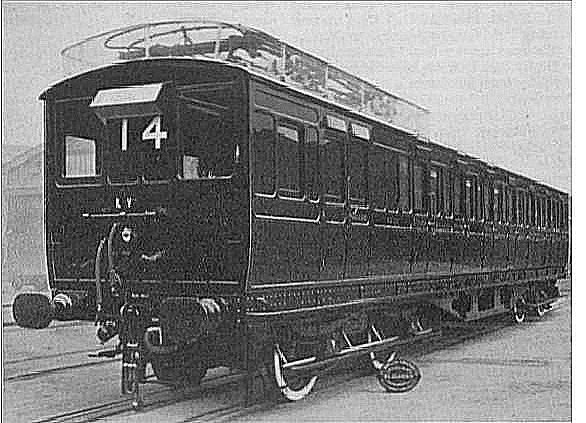
Motor coach built for the L.B.S.C.R. for their new overhead
electrification to Crystal Palace in May 1911
LOCOMOTIVE JOURNAL
MAY 1911
PAGE 231
EASTBOURNE BRANCH
We held our annual cricket match and super on Good Friday, the weather being all that could be desired. The cricket match, married v. single, was a great success and ended in a draw. a good crowd of spectators lined the field, so next year we shall have to think seriously of gate money. The super, to which 53 sat down, was held in our branch meeting room, with Brother Rogers in the chair and Brother F. Taylor in the vice chair. Several ladies were present, and after the company had done justice to the good things provided the tables were cleared and we settled down to hear a concert, arranged by Brother H. Marshall, of all "locomotive talent." The branch secretary, on behalf of the committee, thanked all present for their support, and also our locomotive foreman for arranging the men's duty so as to enable them to attend the super. He also gave a brief report of last year's working, pointing out we had enrolled 2,320 members and effected a saving of £8,350 12s. 2d., a statement which was received with applause. A dance brought to a close s most enjoyable day.
BRANCH SECRETARY
LOCOMOTIVE JOURNAL
JUNE 1911
Extracted and adapted from
A.S.L.E.F. Organising Secretary W. Warwick's report
Page 270
On the following Sunday (16th April) I met, by request, the nominees for the London, Brighton and South Coast Railway Conciliation Board, at the club house of our Bricklayers Branch, where important business in connection with the above was transacted and where I received instruction which caused me to put on a 12 hours on the Monday
On the Monday (17th) I attended the morning meeting of our New Cross Branch, at which some important business was dealt with and the branch secretary nominated as one of four for the above-mentioned Conciliation Board (Northern District). This was a kind of bye-nomination, as one of those previously nominated found he would be unable to give the time and attention necessary during the election.
From New Cross I journeyed to London Bridge and then on to Portsmouth for further important business, which I was able to accomplish with very satisfactory results. I also called upon our secretary there with a view to arranging an open meeting, but have not yet been able to manage the same owing to so many matters forcing themselves to
the front for settlement.
The following day (Tuesday 18th) I attended an inquest at Battersea, and the result of a poor fellow being run down and killed notwithstanding the fact that he was well-accustomed to the place and work. He failed to get out of the way, although the driver saw him and whistled for some distance before knocking him down. The jury thought it was strange that inasmuch as the driver saw the man did not stop and thus save his life; no doubt this seems feasible and reasonable to the outsider such as most of these juries are composed of, but the practical man knows what happen if a driver of an express, such as this was, attempted to stop every time he saw a man in front of him, especially at the place like Clapham Junction. However, in the end the verdict was “accidental death,” no blame being attached to anyone.
On the Friday (21st April) I attended an open meeting at our Battersea Branch clubroom, which was held for the purpose of nominating candidates for the South-Eastern & Chatham Railway Conciliation Board, and which in the end nominated two of our members.On returning from Shoeburyness I attended a Board of Trade inquiry at Battersea Park, where a contractor's man had been fatally injured while working on the electrification. Several were working together and had been duly warned by the look-out man of the approaching train ; all stood clear, but by some means, as the train was passing, the deceased stepped back and was caught by the step of the engine, causing injuries from which he died in hospital a few days afterwards. A seemed to have been a case of momentary forgetfulness and no blame was attached to anyone.
The following Wednesday (3rd May) found me at Newhaven, a small locomotive centre on the London, Brighton and South Coast Railway, about the only one on the Brighton line where we have not got a branch of our Society. I got to work and the necessary preparations by way of hall and bills for open meeting on the Sunday (7th May), but on the Friday (12th May) was called away to attend a Board of Trade inquiry at New Cross. In this case a wagon examiner had been killed whilst engaged in his duties, but after going thoroughly into the matter it was agreed that our member was in no way to blame.
I returned to Newhaven, and at the meeting a few of our members from Brighton and Eastbourne attended, together with Brother Harrison, of Battersea, who preside, but the Newhaven men made a poor show in turning up. However, it was very interesting and this who did attend went away wiser with regard to the position and doing of our Society, and thus, I hope, the first step was taken towards stabbing a branch of our Society at Newhaven.
POSTCARD
SEAFORD STATION
LOCOMOTIVE JOURNAL
JULY 1911
Extracted and adapted from
A.S.L.E.F. Organising Secretary W. Warwick’s
report page 332
The following Wednesday (3rd May) found me at Newhaven, a small locomotive centre on the London, Brighton and South Coast Railway, about the only one on the Brighton line where we have not got a branch of our Society. I got to work and made the necessary preparations by way of hall and bills for open meeting on the Sunday (7th May), but on the Friday (12th May) was called away to attend a Board of Trade inquiry at New Cross. In this case a wagon examiner had been killed whilst engaged in his duties, but after going thoroughly into the matter it was agreed that our member was in no way to blame.
I returned to Newhaven, and at the meeting a few of our members from Brighton and Eastbourne attended, together with Brother Harrison, of Battersea, who presided, but the Newhaven men made a poor show in turning up. However, it was very interesting and those who did attend went away wiser with regard to the position and doings of our Society, and thus, I hope, the first step was taken towards establishing a branch of our Society at Newhaven.
LOCOMOTIVE JOURNAL
HORSHAM
AUGUST 1911
page 377
CONCILIATION BOARD ELECTION
SIR- I beg to tender my heartiest thanks to those who recorded their votes on my behalf as candidate for the Conciliation Board on the Brighton Railway. Although defeated I liken myself to Will Crooks - "I am happy though defeated." I attribute my non-success to a variety of causes, viz:- Not half the locomotive-men recorded their votes, no doubt owing to their disapproval of the scheme; the inclusion of a multiplicity of men off the footplate who exercise their power of the franchise of the all-grade source, a deterrent effect to our likelihood of success; the resignation of our members on the last occasion; being stationed at a rural constituency, lessening the opportunites of defining my policy for guidance of the electorate; and having written and spoken in condemnatory tones of the conciliation scheme it may have affected or jeopardised my position. No mandate was ever received from the men for the acceptance of the scheme, and my policy always has been to co-operate with the directorate for standardisation and classification of locomotive-men hitherto successful in the past.
Yours Fraternally,
J. Payne
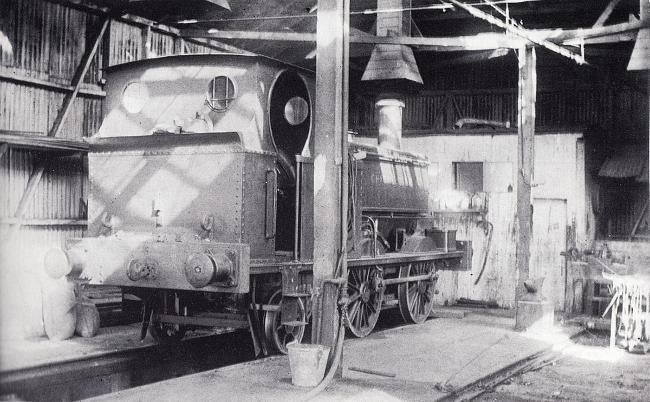
LOCOMOTIVE JOURNAL
AUGUST 1911
Extracted and adapted from
A.S.L.E.F. Organising Secretary W. Warwick's report
Page 374
During the following week I went to Portsmouth, preparatory to an open meeting, which was held there on Sunday, June 11th. Portsmouth has been at a stands still for some time and it was though with a change of Secretary and branch meeting place, an improvement might be effected, so an open meeting was called as a send-off, and I am pleased to say it did not prove disappointing. Bro Harrison, of Battersea, took the chair, and the attendance was good size of the place. After I had addressed the meeting, an interesting discussion took place re conciliation boards, term of service, &c. Brother Harrison explained the position of the London, Brighton and South Coast Railway locomotive-men up to date. The London and South Western Railway men’s position was also explained the concessions as a result of latest movement, and then, on the call for new members, five came forward and paid their entrance fee. These were all London, Brighton and South Coast Railway locomotive-men, while I don’t think were any “NONS” present belonging to the London and South Western Railway, as these men are very well organised. There is every hope, now that as start has been made with the London, Brighton and South Coast Railway, that Portsmouth will soon rank with the best as far as percentages of memberships are concerned.
LOCOMOTIVE JOURNAL
AUGUST 1911
PAGE 380
PORTSMOUTH BRANCH
An open meeting for drivers, firemen and cleaners, was held at the Co-operative Rooms, Gamier Street, on Sunday, June 11th, at which Brother A. E. Harrison, secretary of the Battersea Branch, officiated as chairman. After a few remarks about conciliation boards and the benefits of the Society, he urged all non- members present to join at once. He then called on Mr. Warwick, organizing secretary, to address the meeting, which he did for over an hour to the pleasure of everyone present. His subject was : " The position of locomotive-men and the need for greater unity," and among other things, he quoted the results of the working of conciliation boards, and the concessions that had been obtained from various companies by them, showing how the best times were enjoyed by men who were best organized in their own Society. He pointed out how useless it was for delegates to go before the directors unless they had the men organized and at their backs, as the results were in most cases nil. This showed the need for organization, in order to obtain the best conditions and to retain, them. He spoke of the market value of labour of our fraternity, and the value , placed by the arbitrators, who absolutely knew nothing of what our men had to contend with. At the close of his splendid and stirring address, he asked for " nons " to come forward and join, which was responded to by five of them giving in their names, four paying entrance fees. A hearty vote of thanks was proposed by Brother F. Westaway and seconded by Brother P. Wright to Mr. Warwick for his able address, and to Brother Harrison for the able manner in which he had filled the chair. Before the meeting closed a letter was read by Brother F. Giles, our conciliation board member for the London and South Western Railway, in reference to the free pass that had been granted to the pensioners having been extended to their wives. Hoping that we may be able to report further progress is the wish of
ONE WHO WAS THERE
LOCOMOTIVE JOURNAL
HORSHAM
AUGUST 1911
page 377
CONCILIATION BOARD ELECTION
SIR- I beg to tender my heartiest thanks to those who recorded their votes on my behalf as candidate for the Conciliation Board on the Brighton Railway. Although defeated I liken myself to Will Crooks - "I am happy though defeated." I attribute my non-success to a variety of causes, viz:- Not half the locomotive-men recorded their votes, no doubt owing to their disapproval of the scheme; the inclusion of a multiplicity of men off the footplate who exercise their power of the franchise of the all-grade source, a deterrent effect to our likelihood of success; the resignation of our members on the last occasion; being stationed at a rural constituency, lessening the opportunites of defining my policy for guidance of the electorate; and having written and spoken in condemnatory tones of the conciliation scheme it may have affected or jeopardised my position. No mandate was ever received from the men for the acceptance of the scheme, and my policy always has been to co-operate with the directorate for standardisation and classification of locomotive-men hitherto successful in the past.
Yours Fraternally,
J. Payne
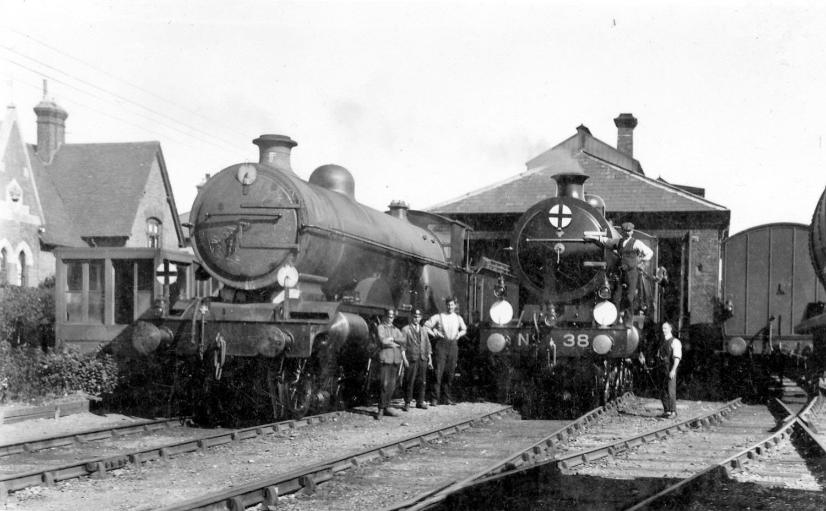
O.J. Morris Collection
Brighton 'Trails enginemen' at Littlehampton shed, September 1911,
with two Atlantic Classes H1 No. 38 ’Portland Bill’ & H2 423 'The Needles.'
THE RAILWAY REVIEW
16TH SEPTEMBER 1911
Theo usual monthly meeting was held on Sunday last. Several new members. One injured member applied for disablement allowance. A good deal of time was taken With the strike business, and the following resolution was carried:
"That this branch endorse the action of the secretary and consider he took the proper steps in calling the members out on strike; but strongly condemn the action of those locomotive members who joined hands with the secretary and officials of the Associated Society in calling a meeting of locomotive men and passing a resolution to remain loyal to the company, also in allowing themselves to be chosen part of a deputation to wait on the locomotive superintendent during such a crisis without consulting or obtaining the consent of the strike committee."
LOCOMOTIVE JOURNAL
SEPTEMBER 1911
Extracted and adapted from
A.S.L.E.F. Organising Secretary W. Warwick's report
page 432
I had to leave for home the same evening, in order to be able to attend an open meeting
at Battersea on Monday (17th June) morning, This meeting was called to deal with the
new eyesight test lately introduced both by the London, Brighton, and South Coast and
the South-East and Chatham Railways, the men belonging to the latter being most in
evidence, for the simple reason, I take it, that the test had been brought into operation
mostly on that line and several of the men had been taken from the footplate. It is ever so
with the locomotive-man; he persuades himself that everything is as right as right can
be, until he sees his comrades tailing around him ; then, and only then, does he wake up
to a sense of his position and begin to move.
Several cases were brought to my notice where men had been taken off, who, for all
practical purposes, were as good as they were ten years ago, but because they failed at
the faddist test they had been reduced and degraded. Some had obtained doctors’
certificates to the effect that their sight was good, and these were being considered by
the powers that be. At present it is difficult to see what the result will be, but from what I
could see and hear, it will depend to a great extent upon how many the companies find
they can dispose of without running themselves short of men to carry on the work. It was
whispered that the men were going down in batches, and for the reason above mentioned
the companies were beginning to stay their hand.
But what a reflection on the intelligence of our footplate men not to be prepared to deal
with matters of this description. If organized in their own Society (as it ought to be
considered a duty and privilege to be) they would have to be consulted before such
obnoxious things were introduced or made a condition of service, instead of which they
are simply made battledore and shuttlecocks of between the companies and Board of
Trade. When the slaughter commences, there is usually a little stir; the officials are
waited on and they at once assume a serious countenance and say how sorry they are,
but it's the Board of Trade; an interview is then arranged with that body, which tells us
its members must be satisfied that the men in charge of our locomotives have proper
eyesight, but, at the same time, it has not suggested any particular test to the companies;
and so, men who have spent a lifetime to attain to their position and are rendering
untold service both to employers and public, are practically being fooled ; nay, worse,
for their only means of livelihood is being taken away with impunity; and the irony of it
all is, the very men who are being thus dealt with are standing idly by and trusting to
blind chance, instead of getting inside their organization which could and would help
them. And so we are driven to the conclusion the fault is not all with the companies, or
the Board of Trade, but with ourselves, who refuse to make use of the only means
whereby we can save ourselves.
I also attended a second meeting on the Tuesday (18th June) evening, at which Mr. Stevenson, E.C. member, was present. At both these meetings the working idea was trotted out by our A.S.R.S. friends, and on the Monday, owing to the indifference of our own members, they were able to carry their resolution, which got rescinded on the Tuesday evening owing to the reverse in the attendance, another lesson, if such was needed, of the folly of the present divided condition.
On Wednesday (19th June) I got a wire from our Battersea Branch Secretary informing me an inquest was be held in which one of our members. Was concerned, but was unable to give time or place. I at once "visited St. George’s Hospital to ascertain same, and found it was to be held on the following day, Friday (21st), at the Westminster Coroner's Court. I attended on our member's behalf, who unfortunately had knocked down a man, causing fatal injuries. It was proved conclusively that the fault rested with the poor fellow himself, and although the coroner made very close inquiries as to rules, Sec, he could only recommend the jury to return a verdict of " accidental death.”
On the Monday (24th) I visited West Croydon, re branch affairs and general internal working, in order to report to Mr. Fox.
THE RAILWAY REVIEW
11TH OCTOBER 1911
BATTERSEA
The usual meeting on 15th inst. Several applications for suspension pay were considered, some granted others referred to the committee. Correspondence re-compensation cases: the company now agrees to pay an additional £8 as value of uniform and will pay money into court. Circular re National Insurance Bill from joint committee of Labour, B.T. and L. Council, and S.D.P. was read. A case of reduction in wages and violation of Conciliation Board settlement was referred to committee for consideration and report. A letter from Brighton No.1 Branch read with the previous correspondence, when it was resolved;
"That after hearing the whole of the correspondence read, and again reviewing the position, we endorse the action of our secretary and assistant secretary, and consider they carried out the wishes of the branch in every way."
The question of continued violation of the strike settlement by the S.E. & C. was carefully considered, and two resolutions carried unanimously instructing the secretary to press this matter with head office and the Board of Trade. The question of a vigilance committee was again before the meeting. The secretary was instructed to thank the superintendent of the L.B.S.&C.R. for the attention paid to our suggestion for protection of lives and limbs of men working on the line in this district.
THE RAILWAY REVIEW
13TH OCTOBER 1911
A STRIKE ECHO
BRIGHTON
A meeting was held in the Drill Hall, Brighton, on 8th inst, to hear the exchange views on the fiasco at Brighton in August last, and decided on a better and more determined attitude in future. The cognomen given them by the company and public does not agree with a good number of them. There was a large attendance, but this whole in the past had been looked upon as leaders were conspicuous by their absence although they had been specially invited to attend.
A large, keen animated discussion took place between both sides, company's "loyalist" and men's "loyalist," which undoubtedly will be productive of much good.
The following resolution was carried unanimously:
"That this meeting expresses it's appreciation at the united determined stand made by our colleagues in the northern district at the call of the Joint E.C.'s in August last against the many and varied grievances under which we have long been suffering, and further, desire to assure them that we pledge our support in any action the Joint E.C.'s may decide in future to achieve our object."
NEW CROSS
Meeting held on the 7th inst., with another crowded attendance, including visitors West Central Electric. We again increased membership by eight; more for next next week. Correspondence from Deptford, Spa Road and Maze Hill. five cases of suspension were dealt with and one donation. collection sheets on behalf of our comrades in Ireland will be before meetings.
Delegate appointed to work with the A.S.L.E.&F. Report of last meeting of Brighton District Council, and representative appointed to attend Brighton meeting on the 8th. Report of conference of local branches of the four railway societies for future working was given. This conference means business, and to commence with a joint mass meeting has been arranged for November 5th. Look out for bills later. Next meeting 14th inst., at 7 p.m. prompted.
LOCOMOTIVE JOURNAL 1911
page
HORSHAM BRANCH
HORSHAM.—Mission Hall, Barrington Rd., Horsham.
Third Sunday in the month, 3 p.m.
The following resolution was carried at a Special Meeting held on December 8th:
"That this meeting of the above Branch greatly appreciate the work and arduous task of our worthy E.C. and General Secretary in obtaining the Eight Hour Day for locomotivemen and other grades, and we have the confidence that they will again acquit themselves when the opportunity arises with the standardization of wages."
Branch Chairman,
Jesse H. Bone,
Branch Secretary,
W. H. Worcester
LOCOMOTIVE JOURNAL
OCTOBER 1911
page 491
HORSHAM BRANCH
An open meeting for drivers, firemen and cleaners was held at the Mission Hall, Barrington Road, on Sunday, September 17th, at which Brother J. Payne, ex-chairman of our branch, was elected to preside. After a few well chosen remarks, he referred to the Conciliation Scheme and recent delegations. He then called on Mr. Warwick, our organizing secretary, who addressed the meeting for over an hour, to the greatest satisfaction of every one present. His subject was " The Conciliation Boards and the recent crisis." I was sorry we had not a larger attendance, but was pleased to see representatives from Brighton, Portsmouth, Littlehampton and Midhurst. After the usual vote of thanks to the chairman and Mr. Warwick, we brought a very pleasant meeting to a close.
BRANCH SECRETARY
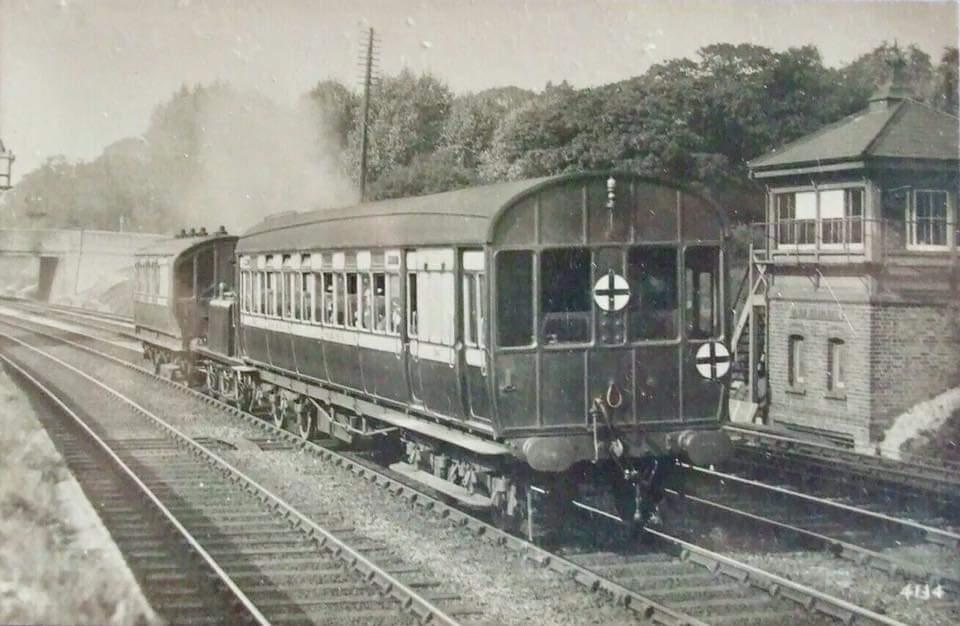
LOCOMOTIVE JOURNAL
NOVEMBER 1911
PAGE 532
BATTERSEA BRANCH
It is not often a report appears in the Journal from this branch, but that fact does not imply that we are not alive. At a meeting recently held it was decided to have an outing to Brighton, on October 8th, and seeing that business at times can be coupled with pleasure, it was also decided to take advantage of the occasion and hold a meeting there as well. All being arranged, we left Victoria by the 8.50 a.m., in two saloons which our locomotive outdoor superintendent had favoured us with, and arrived at Brighton up to time and in good spirits. We all made our way to the good old seashore and had our photographs taken. Lunch was afterwards served at the Grand Rink Restaurant, and as it is not often we have time, peace and comfort in taking our meals, we all did full justice to the good things provided and thoroughly enjoyed them as well. Having satisfied the inner man, we journeyed to the Drill Hall, Church Street, which we had been granted the use of for the meeting. This was a very successful part of our day's outing, as about 500 were present. After hearing speakers from members of both the Battersea and Brighton Branches, the following resolution was carried unanimously :—
" That this meeting expresses its appreciation at the united and determined stand made by our colleagues in the northern district at the call of their Executive Councils, in August last, against the many and varied grievances under which we have long been suffering, and further desire to assure them that we pledge our support in any action the Joint Executive Council may decide in future.”
After the usual votes of thanks, this meeting was brought to a close, after two hours and a half, which must have been interesting to everyone, as not one man left before time. Having again refreshed ourselves, We broke up into groups and had a stroll round the town, meeting again at the station to catch the 9.35 p.m., when all expressed themselves as having spent a very enjoyable day in sunny Brighton. The last business we had to conduct before we separated was to say farewell to one of our firemen, who was sailing for Australia the next day. I might mention that we have now to call upon our Executive Council to provide three of their special medallions, which proves that sometimes “ silence is golden,” as in this case 75 new members have been added to our ranks by three of our members.
ONLY A BOY.
LOCOMOTIVE JOURNAL
NOVEMBER 1911
Extracted and adapted from
A.S.L.E.F. Organising Secretary W. Warwick's report
page 474
When I returned from the inquiry I found a telegram awaiting me to the effect that a member of our Brighton Branch had met with a serious accident at London Bridge and was lying at Guy’s Hospital. I ay once made my way over and found on inquiries he was doing fairly well and likely to recover.
On the Monday (4th Sept.) I again visited Guy’s Hospital re out Brighton member, after which I attended the commission.
THE RAILWAY REVIEW
7TH NOVEMBER 1911
NEW CROSS
Weekly meeting held on the 11th inst. Standing room only for the late comers. Our first joint mass meeting on the 5th inst., is now bearing fruit. We commenced with 33 new members and some for next meeting. One suspension case had attention matters in connection with L.B. & S.C. Central Conciliation Board meeting, when it was received ;
"That this branch emphatically protest against the electric motormen being included in the proposed new board, and we instruct our Central Board representatives on the necessity of these motormen being included in the loco. board."
Reports given stops being taken to arrange for another joint mass meeting. Unfortunately we cannot find a hall large enough, and we do not like to turn any away again. Further nominations received for 1912 concert committee. Attention was drawn to the continued illness of one of our brothers, and the B.F. decided to clear his card up to the end of year. Visitors present from West Central Electric. Next meeting on the 18th inst. at 7p.m. prompt.
NEWHAVEN
The ordinary meeting was held on Sunday. A report of recent meeting of the Central Conciliation Board was given, and a sub-committee appointed to draw up loco men's grievances.
Bro. J. Dobson was present and gave an excellent address on the history of the railway dispute.
THE RAILWAY REVIEW
10TH NOVEMBER 1911
BATTERSEA
Meeting held on the 3rd int. Secretary reported the fatal accident to Bro. Wilkinson, carriage cleaner, S.E.&C.D., and was instructed to convey the sympathy and condolences of the members to the widow and family. Councillor J. Dobson, organising secretary, sent a reports upon the inquest re-fatal accident, sent and also a further report upon the Board of Trade Inquiry into the accident at Bromley, S.E.&C.D. Letter was read from the Board of Trade re-our resolution which dealt with the refusal of the L.B.&S.C. to hold Sectional Board meetings in accordance with the strike settlement, the company stating that a Central Board meeting would be held on the 3rd inst., when the question would come up for discussion. The correspondence from H.O. re- S.E.&C.D. Colman acting as engine driver and penalising the firemen was discussed, and secretary instructed. Correspondence re - L.B.&S.C. loco men's grievances, and the report of the vigilance committee, who have a long list of grievances which require rectifying. Efforts will be made by amicable negotiations, which should remove the grievances. Every member should see that the secretary is given their change of address at once.
THE RAILWAY REVIEW
17TH NOVEMBER 1911
BATTERSEA
The usual meeting on 10th inst. Benevolent Fund and Santa Claus fund committees face reports, which were adopt. Report given re L.B.&S.C. loco men's grievances. Several compensation cases dealt with. That humble petition which a few are trying to push on the L.B.&S.C. plate layers gave some amusement to the members when read. This child like faith and humbleness should be supplanted by manhood. The branch committee will be considering the distribution of ballot papers and every member should get on; so buck up and call for it art the Masons' Arms on Friday night.
CROYDON
The usual weekly meeting was held on Friday last, with a splendid attendance. Eight new members. A large number of electric motormen were present to hear Bro. Pargeter, secretary of the Central Conciliation Board re the company wishing to a adopt a Sectional Conciliation Board for all wage earners in the electric department, but this the electric motorman strongly resent, and desire to be placed on the loco men's Sectional Board. it was decided to hold a mass meeting at Norwood Junction on 19th inst. The Stanley Hall, South Norwood, has been engaged for the purpose, and Councillor S. Stranks will take the chair, Bro. Pocock, chairman of Central Board, and Bro. Pargeter, secretary Central Board, will, with others, address the meeting.
LOCOMOTIVE JOURNAL
DECEMBER 1911
PAGE 591
PORTSMOUTH BRANCH
An open meeting in ccnnecticn with the above branch was held en November 12th, at the Co-operative Rooms, Fratton Road, when Mr. Warwick, organizing secretary, and Brother S. Higgins, of Nine Elms Branch, attended. Brother Higgins tock the chair and after a few suitable remarks called upon Mr. Warwick to address the meeting, which he did in a very able manner for about 70 minutes, taking for his subject “ The Result of the Strike and the Report of the Royal Commission.” He congratulated the branch upon its increase of 20 members during the quarter. It behoved every railwayman to see he was in his organization and follow the example of the Great Liberal Government, and also take for their motto that of the Naval Gunnery School of this town, which reads :—“ in times of peace prepare for war.” He also illustrated the economy practised by the companies. We had a good insight into the new scheme embodied in the Commissioners’ Report, which evidently seems to be well worth a trial. He urged us to beware of the independent chairman, which was only an arbiter with another name. Reference was also made to Mr. Churchill’s speech at Dundee, regarding: the strike weapon, which we undoubtedly laid aside with the 1907 agreement, but which we had regained and should hold as a birthright. After urging the “ nons “ Higgins,- who referred to the scheme recently put forward en the London and South-Western Railway, but which had since been withdrawn. He regretted the attitude of the members of the Nine Elms Branch during the recent strike, and urged the men, when the next election tock place, to be sure that those nominated were men who could be depended upon, and not these with an eye to self-aggrandizement. Brother Higgins then presented the Executive Council special medallion to Brother P. Wright for proposing 25 new members during this- year. He gave him the good wishes of the Society and hoped he would live long, enough to wear it out. On the call for questions the few asked were answered satisfactorily by Mr. Warwick and Brother Higgins. On a resolution of Secretary, and Brother S. Higgins, of confidence in our Executive Council being proposed and put to the meeting, it was carried unanimously, as was also a hearty- vote of thanks to Mr. Warwick for his most able address and to Brother Higgins for occupying the chair. This brought to an end one of the best and most interesting meetings of locomotive-men it has ever been my pleasure to attend in Portsmouth, and which has resulted in a further increase of five new members. Hoping this will not be the last meeting of this description is the wish of
ONE OF ‘EM
LOCOMOTIVE JOURNAL
DECEMBER 1911
Extracted and adapted from
A.S.L.E.F. Organising Secretary W. Warwick's report
page 576
The following Sunday (17th Sept) I attended and address an open meeting at Horsham at which a few of our members from Portsmouth and Brighton were present. I see our Secretary has reported to the Journal so there is no need for me to take up space.
On arriving home I was called to Eastbourne to attend an inquest on behalf of members of that branch. From the evidence it appears a goods guard had attempted to reach the platform as the train was running in, with the result that he was knocked down, receiving fatal injuries. The jury returned a verdict of “accidental death."
The Brighton Enginemen
that have been identified in the 1911 Census
NEAL COWDREY